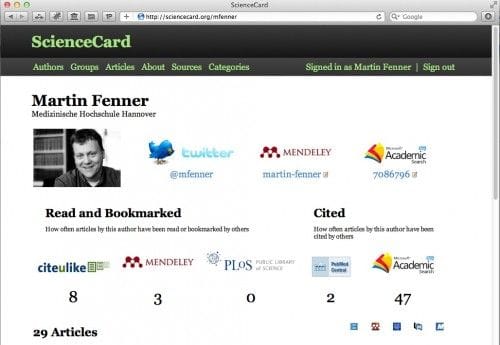Metrics for scholarly works are used for evaluation and discovery. The Journal Impact Factor is widely used, but is not the best tool to look at the metrics of an individual article. In the past few years we finally started to have the technology to do article-level metrics (citations, downloads, etc.) and PLoS has pushed this concept since at least 2009. I first heard about the PLoS Article-Level Metrics project in a presentation given by Pete Binfield in July 2009, and a month later I interviewed him about this project.
Article-level metrics are a major step forward from journal-level metrics, but I always wanted to extend this concept to authors. Three events in the past few weeks worked nicely together and made me start an author-level metrics project myself: programming contest by Mendeley and PLoS with a September 30 deadline, a hackfest following the Science Online London Conference in early September, and two conferences (in Helsinki and Geneva) in mid-September discussing the value of unique author identifiers for researchers.
I’ve taken the Open Source Article-Level Metrics API Server from PLoS and added a few important features: metrics by author, additional metrics from Mendeley and Microsoft Academic Search, and a web-based interface that less authors register via their Twitter account. The result is ScienceCard, a website I launched this weekend and today entered for the Mendeley/PLoS Binary Battle contest. ScienceCard currently uses Microsoft Academic Search to find all papers of a particular author, the next version will allow users to retrieve info about their personal papers from Mendeley.
Working on ScienceCard has already taught me a lot about the problems we face when doing metrics for scholarly works. Most problems are social and not technical. Digital object identifiers (DOIs) for example have been the standard identifier for journal articles for ten years, but many places (including PubMed, Microsoft Academic Search and Mendeley) want users to use their own identifiers for journal articles. This makes it unnecessarily difficult to find articles and collect metrics. Identifiers for authors are even more complicated. ScienceCard will of course use ORCID identifiers when they become available in 2012, and I hope that I can make the transition to ORCID easier for ScienceCard users.
Let me know what you think.


